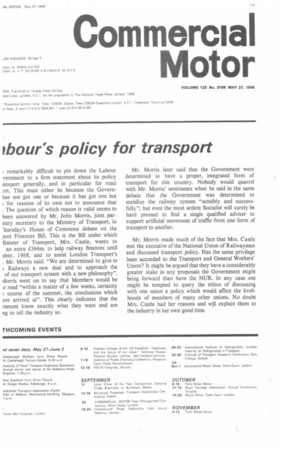thour's policy for transport
Page 77

If you've noticed an error in this article please click here to report it so we can fix it.
; remarkably difficult to pin down the Labour vemment to a firm statement about its policy ansport generally, and in particular for road ort. This must either be because the Governhas not got one or because it has got one but ; for reasons of its own not to announce that • The question of which reason is valid seems to been answered by Mr. John Morris, joint paritary secretary to the Ministry of Transport, in 'hursday's House of Commons debate on the port Finances Bill. This is the Bill under which linister of Transport, Mrs. Castle, wants to an extra £366m. to help railway finances until nber, 1968, and to assist London Transport's . Mr. Morris said: "We are determined to give to Railways a new deal and to approach the of our transport system with a new philosophy". vlorris went on to say that Members would be o read "within a matter of a few weeks, certainly course of the summer, the conclusions which aye arrived at". This clearly indicates that the rnment know exactly what they want and are ng to tell the industry so. Mr. Morris later said that the Government were determined to have a proper, integrated form of transport for this country. Nobody would quarrel with Mr. Morris' sentiments when he said in the same debate that the Government was determined to stabilize the railway system "sensibly and successfully"; but even the most ardent Socialist will surely be hard pressed to find a single qualified adviser to support artificial movement of traffic from one form of transport to another.
Mr. Morris made much of the fact that Mrs. Castle met the executive of the National Union of Railwaymen and discussed transport policy. Has the same privilege been accorded to the Transport and General Workers' Union? It might be argued that they have a considerably greater stake in any proposals the Government might 'bring forward than have the NUR. In any case one might be tempted to query the ethics of discussing with one union a policy which would affect the livelihoods of members of many other unions. No doubt Mrs. Castle had her reasons and will explain them to the industry in her own good time.




































































































































































































































































